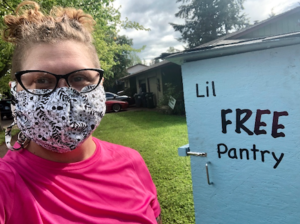Risk and Resilience

I’ve been thinking (and talking and writing) a lot these days about the “lessons” we are–or should be–learning from this pandemic. For example:
Don’t empower and support an aggressively ignorant, amoral sociopath to be your leader in time of crisis. Or any time.
Don’t treat the elderly as if their lives don’t matter. Don’t warehouse them in “facilities” and then underpay and undervalue those who care for them.
Don’t incarcerate 2.3 million people and crowd them into unsafe, unhealthy, hostile places that are cages within cages.
Don’t ignore the horrible irony of asking people to #stayhome when more than 4 million people are homeless.
We are learning other lessons too. We are learning how compassionate and generous people are. And we are learning how nasty and stupid people can be. We hear about the owners of shuttered restaurants cooking and delivering meals to health care workers. We see protestors with Nazi signs and assault rifles calling for “business as usual” on the steps of state capital buildings. We learn of teachers making daily calls to every one of their students to check up on them. We read about the murder of a security guard at a Family Dollar Store, shot after denying entry to an unmasked customer. We are learning who we are, for better and worse.
I think there is also a long-term lesson to be learned about R&R. No, not Rest and Relaxation. I mean Risk and Resilience.
We are living through a time of great risk. This is not just risk to our physical health but also to our emotional and psychological well-being. And it is not just a risk to our personal health but to the moral health of our nation.
One response to risk is fear. (This shuts down meaningful thought and thoughtful action. Another response is claiming victimhood. (Surely someone is responsible for putting me at risk. Who’s to blame?) Another is purposeful, aggressive ignorance. (Risk? What risk? I am okay. That’s what matters.)
I would like to suggest another response: Resilience. This is a mindset that empowers us to see ourselves as actors who make things happen, not victims to whom things happen. Resilience is the ability to bend, to remain supple and flexible, to spring back. Resilience means developing goals instead of focusing on barriers. It means recovering by taking clear-headed, decisive action.
Resilience, say those who study it, is a combination of optimism and endurance. Optimism is not a looking-at-the-world-through-rose-colored-glasses thing. It’s more a belief in your own efficacy. And endurance is not some nose-to-the-grindstone slog through change and challenge. Endurance is what naturally occurs when you have–and decide to pursue–a worthy goal. All of this can be learned. Yes, learned.
And this pandemic, this crisis, is a perfect opportunity for us to do so. As individuals. And as a nation.
What is your resilient response? What should be our country’s?
The image above is of (and taken by) my friend, my Food for Lane County Dining Room colleague, and one of the most resilient, generous and loving people I know, Angie Godlasky. Among her many resilient responses is this pop-up pantry in her front yard that offers free food for those in need.






1 comment
We should be learning the pleasure of being at home with those we love and that we need far fewer people working far less hard to to fulfill our real needs. It’s time to eliminate our frenzied work, Work, WORK ethic and head toward a less frantic world spending more time with the people and things we love and less time on planet-killing materialism.
Leave a Comment